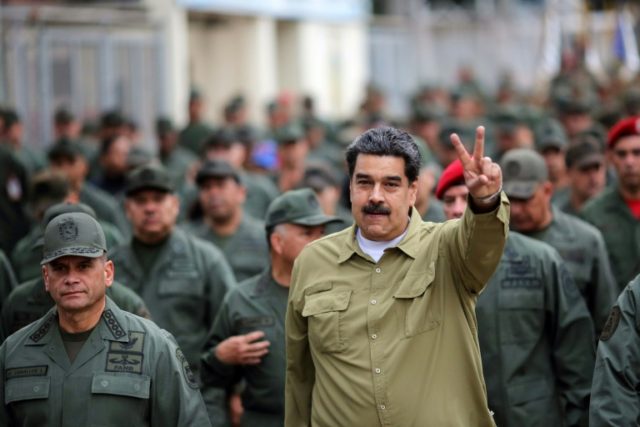WASHINGTON, DC — “Growing dissatisfaction” within the Venezuelan military is spreading in the chaos-ridden South American country, a top U.S. Department of State (DOS) official testified before a House panel on Wednesday.
U.S. President Donald Trump’s Special Representative for Venezuela Elliot Abrams conceded that there have only been a “few isolated cases” of defections from Maduro’s side since the country’s National Assembly inaugurated Juan Guaidó declared himself interim president last month. The United States and an estimated 50 other countries in the Western Hemisphere and beyond recognize Guaidó as the nation’s legitimate president.
Abrams’ comments came during a House Foreign Affairs Committee hearing on the humanitarian crisis, political chaos, economic destruction, and insecurity triggered by Maduro’s socialist regime in Venezuela.
Despite the few defections thus far, the top DOS official declared that the United States is aware of “a lot of discontent in the military” in Venezuela, adding:
I mean, for one thing, if you’re a general down at the ranks, you know that your own people in the army are starving. And what about their mothers and sisters and brothers and fathers? So we think that this opinion [of dissatisfaction] is spreading within the military that the current situation is untenable and we hope that there will be a decision on the part of many in the military first not to support the Maduro regime, but secondly not to block desperately needed humanitarian aid.
While the Trump administration has approved at least $140 million in humanitarian assistance, Maduro and his supporters are preventing the life-saving aid from reaching the Venezuelan public, Abrams noted.
An anonymous White House official recently told Reuters the Trump administration expects more defections and is holding direct discussions with members of Venezuela’s military urging them to abandon Maduro as the United States government prepares new sanctions aimed at boosting pressure on the dictator.
The Trump administration has sanctioned high-ranking military officials in Venezuela over corruption and undermining human rights.
Abrams noted in his written testimony:
As a result of this growing pressure, there is a storm brewing inside the inner circle; a growing dissatisfaction and distrust that will eventually bring about an end to Maduro’s reign of terror. While it is impossible to predict the moment this will happen, we believe the current political and economic environment is unsustainable and that he will not be able to weather it much longer.
Abrams also attempted to spur wider mutiny within the Venezuelan military, where many officers loyal to Maduro are allegedly benefiting from corruption and drug trafficking linked to the regime.
The State official proclaimed in his written testimony:
[F]or those remaining supporters of the former Maduro regime, we have one simple message: your time is up. A new, free, and prosperous Venezuela is rising, and your fellow citizens will remember who stood by them in their struggle. This includes especially the armed forces and all security forces, who will be needed in the future to build a secure Venezuela where law and order defeat criminality and violence. Now is the time for the armed forces to support the Venezuelan people, reclaim their own legitimacy, and turn to helping build tomorrow’s Venezuela.
Venezuela is currently facing the worst economic, political, and humanitarian crisis in its history as it nears the 20th anniversary of the socialist “Bolivarian Revolution” under late dictator Hugo Chávez, Maduro’s predecessor.
The average Venezuelan citizen, including many members of the military, cannot secure three meals a day and lost 24 pounds in 2017, the latest year for which that statistic is available.
Dictator Maduro has repeatedly denied the existence of any humanitarian crisis in the country, claiming both the alarming statistics and the millions-strong refugee exodus from his nation are American government fabrications.
The last remaining federal democratic institution in the country, the National Assembly, removed Maduro from power via constitutional fiat on January 23, replacing him with interim President Juan Guaidó.
Maduro, however, still controls the nation’s military and has refused to step down.
Eric Farnsworth, the vice president of the U.S.-based Council of the Americas think-tank, indicated to Reuters that “members of the South American country’s security forces fear they or their families could be targeted by Maduro if they defect, so the U.S. would need to offer them something that could outweigh those concerns.”
President Trump has said U.S. military force in Venezuela is on the table, without specifying under what circumstances he would employ such an option.
Rep. Eliot Engel (D-NY), the chairman of the House panel that held the hearing Wednesday, explicitly declared that “Congress would not support military intervention in Venezuela.”
“I want to make clear to our witnesses and to anyone else watching: U.S. military intervention is not an option,” the chairman said in his opening remarks.
Before Trump took office, Abrams criticized the president’s fitness to be commander-in-chief.

COMMENTS
Please let us know if you're having issues with commenting.